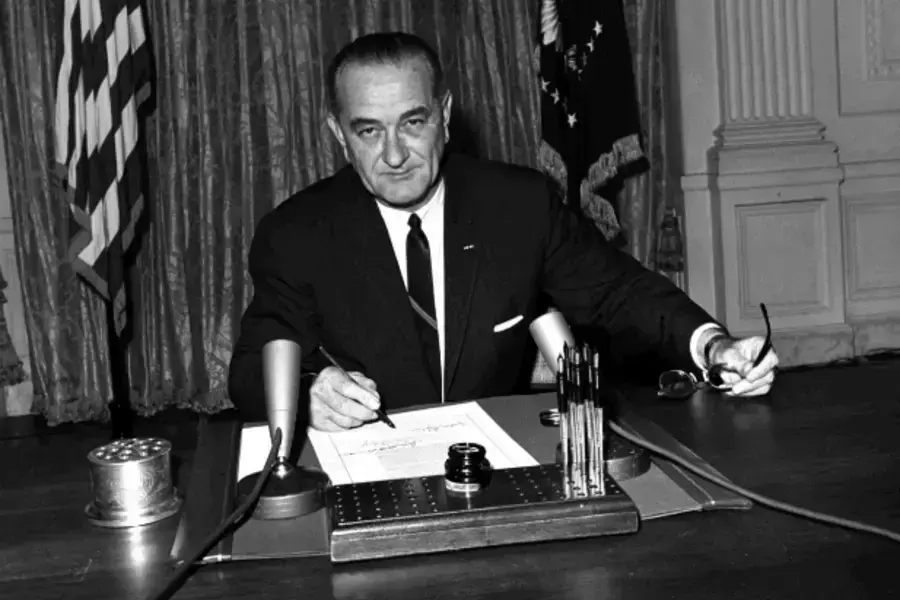TWE Remembers: Congress Passes the Gulf of Tonkin Resolution

“Act in haste, repent at leisure.” “Look before you leap.” “Fools rush in where angels fear to tread.” Warnings against acting rashly are frequently offered. They are just as frequently ignored. The results can be tragic. A case in point is the Gulf of Tonkin Resolution, which Congress passed on August 7, 1964.
Congressional debate on the Gulf of Tonkin Resolution came in the wake of reports that North Vietnamese patrol boats had launched an unprovoked attack on two U.S. destroyers in international waters in the Gulf of Tonkin on the night of August 4. President Lyndon B. Johnson acted quickly. In a “midnight speech” after the late local news, he informed the American public of the attacks and his decision to order a retaliatory strike—the first overt U.S. attack on North Vietnam.
More on:
Johnson also asked Congress for swift consideration of a resolution endorsing his commitment to confront North Vietnam. The resolution stated that “Congress approves and supports the determination of the President, as Commander in Chief, to take all necessary measures to repel any armed attack against the forces of the United States and to prevent further aggression.” Johnson captured the resolution’s expansive nature when he quipped, "It’s like grandmother’s nightshirt. It covers everything."
Johnson got the swift consideration he requested. The House dispensed with any hearings and approved the resolution on August 6 in just forty minutes. Senate consideration was glacial in comparison. The Senate Foreign Relations Committee first held an emergency hearing. Then the full Senate took up the resolution. After eight hours and forty minutes of debate spread over two days, the Senate voted 88-2 on August 7 to adopt the resolution. Johnson signed it three days later.
Johnson had pushed for the Gulf of Tonkin Resolution because he thought having Congress involved in the take-off in his Vietnam policy would protect him politically in the event of a crash landing. It didn’t. Many lawmakers came to regret their vote as American casualties in Vietnam grew and evidence mounted that the administration had withheld critical information from Congress when it voted on the resolution. The reported attack on the night of August 4 hadn’t in fact been a cut-and-dried case of unprovoked North Vietnamese aggression. The administration had good reason from the start to doubt that the attack had taken place—and it is clear now after years of investigation that it didn’t. Moreover, it knew that an earlier attack on one of the U.S. destroyers had been provoked by a U.S. orchestrated plan in which South Vietnamese commandoes had attacked North Vietnamese military installations.
Congress repealed the Gulf of Tonkin Resolution in January 1971. The move did nothing to stop the war. Congress continued to appropriate funds to finance it, and President Richard Nixon insisted that he had other legal authority to wage it. U.S. combat troops would not leave South Vietnam for another two years.
Some of the lawmakers who regretted their vote on the Gulf of Tonkin Resolution later contended that they did not know at the time that they were voting for war. Senator J. William Fulbright (D-AR), who as chair of the Senate Foreign Relations Committee managed the Senate floor debate on the resolution, wrote in 1979: “I surely did not anticipate” that the resolution “would be invoked as legal sanction for a full-scale war,” and as a result, it “must stand as the only instance in the nation’s history in which Congress authorized war without knowing that it was doing so.”
More on:
The text of the Senate debate on the resolution, however, suggests otherwise. The senators—at least the ones who went to the floor—returned repeatedly to the question of whether the resolution empowered the president to use military force in Southeast Asia as he saw fit. They agreed that it did. An exchange between Senator John Sherman Cooper (R-KY) and Senator Fulbright is indicative:
Mr. Cooper: Then, looking ahead, if the President decided that it was necessary to use such force as could lead into war, we will give that authority by this resolution?
Mr. Fulbright: That is the way I would interpret it.
The two senators who voted against the resolution, Ernest Gruenig (D-AK) and Wayne Morse (R-OR), both warned their colleagues that they were approving an undated declaration of war. The fact that events proved them right, however, did not help either man politically. They both lost their bids for re-election.
 Online Store
Online Store